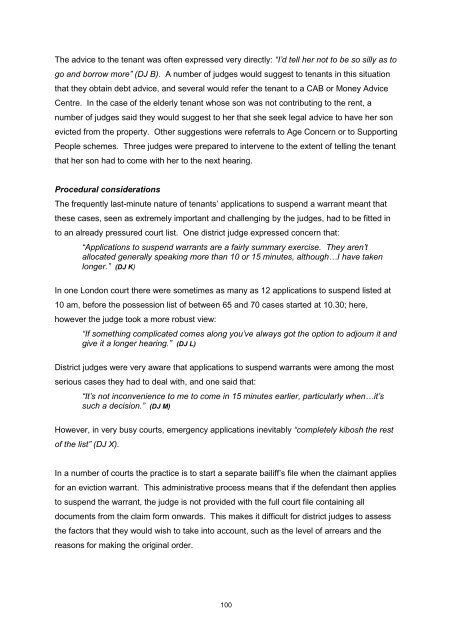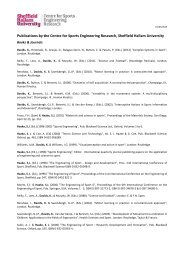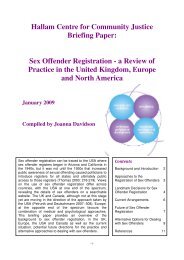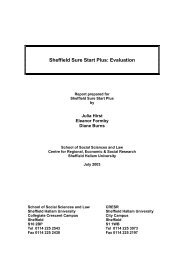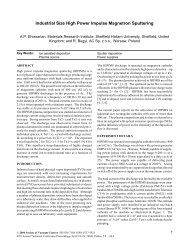The exercise of judicial discretion in rent arrears cases - Sheffield ...
The exercise of judicial discretion in rent arrears cases - Sheffield ...
The exercise of judicial discretion in rent arrears cases - Sheffield ...
You also want an ePaper? Increase the reach of your titles
YUMPU automatically turns print PDFs into web optimized ePapers that Google loves.
<strong>The</strong> advice to the tenant was <strong>of</strong>ten expressed very directly: “I’d tell her not to be so silly as to<br />
go and borrow more” (DJ B). A number <strong>of</strong> judges would suggest to tenants <strong>in</strong> this situation<br />
that they obta<strong>in</strong> debt advice, and several would refer the tenant to a CAB or Money Advice<br />
Centre. In the case <strong>of</strong> the elderly tenant whose son was not contribut<strong>in</strong>g to the <strong>rent</strong>, a<br />
number <strong>of</strong> judges said they would suggest to her that she seek legal advice to have her son<br />
evicted from the property. Other suggestions were referrals to Age Concern or to Support<strong>in</strong>g<br />
People schemes. Three judges were prepared to <strong>in</strong>tervene to the extent <strong>of</strong> tell<strong>in</strong>g the tenant<br />
that her son had to come with her to the next hear<strong>in</strong>g.<br />
Procedural considerations<br />
<strong>The</strong> frequently last-m<strong>in</strong>ute nature <strong>of</strong> tenants’ applications to suspend a warrant meant that<br />
these <strong>cases</strong>, seen as extremely important and challeng<strong>in</strong>g by the judges, had to be fitted <strong>in</strong><br />
to an already pressured court list. One district judge expressed concern that:<br />
“Applications to suspend warrants are a fairly summary <strong>exercise</strong>. <strong>The</strong>y aren’t<br />
allocated generally speak<strong>in</strong>g more than 10 or 15 m<strong>in</strong>utes, although…I have taken<br />
longer.” (DJ K)<br />
In one London court there were sometimes as many as 12 applications to suspend listed at<br />
10 am, before the possession list <strong>of</strong> between 65 and 70 <strong>cases</strong> started at 10.30; here,<br />
however the judge took a more robust view:<br />
“If someth<strong>in</strong>g complicated comes along you’ve always got the option to adjourn it and<br />
give it a longer hear<strong>in</strong>g.” (DJ L)<br />
District judges were very aware that applications to suspend warrants were among the most<br />
serious <strong>cases</strong> they had to deal with, and one said that:<br />
“It’s not <strong>in</strong>convenience to me to come <strong>in</strong> 15 m<strong>in</strong>utes earlier, particularly when…it’s<br />
such a decision.” (DJ M)<br />
However, <strong>in</strong> very busy courts, emergency applications <strong>in</strong>evitably “completely kibosh the rest<br />
<strong>of</strong> the list” (DJ X).<br />
In a number <strong>of</strong> courts the practice is to start a separate bailiff’s file when the claimant applies<br />
for an eviction warrant. This adm<strong>in</strong>istrative process means that if the defendant then applies<br />
to suspend the warrant, the judge is not provided with the full court file conta<strong>in</strong><strong>in</strong>g all<br />
documents from the claim form onwards. This makes it difficult for district judges to assess<br />
the factors that they would wish to take <strong>in</strong>to account, such as the level <strong>of</strong> <strong>arrears</strong> and the<br />
reasons for mak<strong>in</strong>g the orig<strong>in</strong>al order.<br />
100



